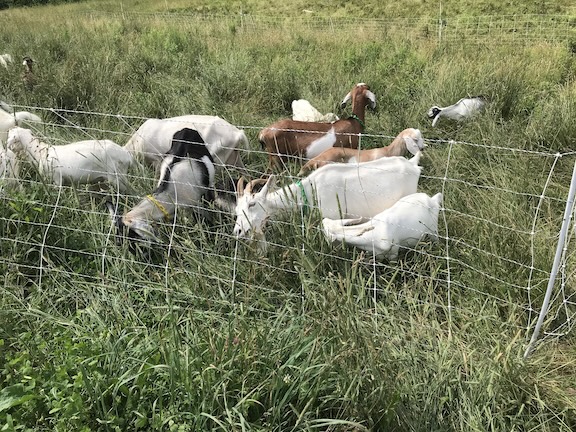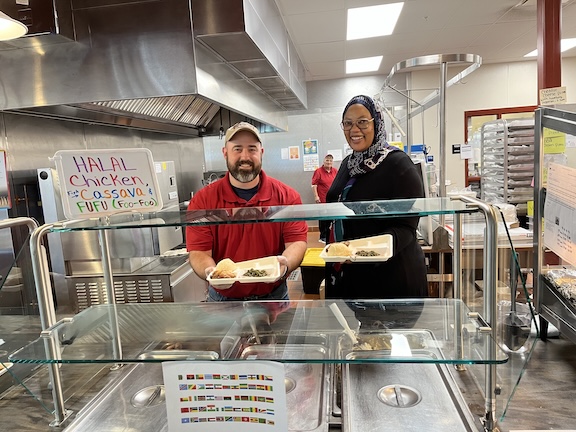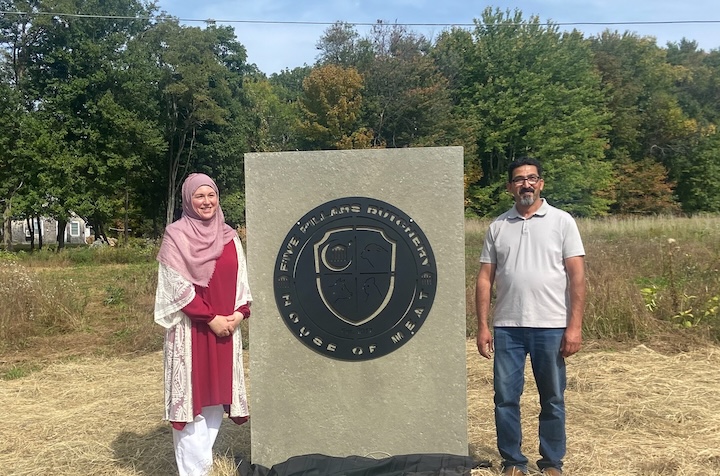By Tim King
Nearly a quarter century ago, Jim Hanna, who is now the executive director of the Cumberland County Food Security Council, met with a group of newly arrived Americans to discuss their food security needs. These new community members from Somalia were Muslim and had dietary needs that Hanna was unfamiliar with at the time.
“They needed halal meat products but they were unable to find them locally,” Hanna recalled. “Their solution was to import them from New Zealand.”
To be halal, meat must come from animals that have had a halal life and a halal slaughter. To have had a halal life, “every day in an animal’s life should be happy until the very last day,” according to the website of Five Pillars Butchery, a halal butchery in Unity, Maine. “The animal should be treated humanely, fed properly, allowed to live outside and have freedom of movement.” A halal slaughter is respectful of the animal in its last moments and is done with thankfulness to Allah. “Muslims believe that in order to have permission to take the life of the animals, there must be a need or purpose and permission needs to be taken from The Giver of that life,” the website continues.
Many of the new Americans that were having difficulty locating halal meat products had previously raised livestock for their livelihoods.
“As I visited with them it became apparent that they had lots of livestock experience,” Hanna said.
Muhidin Libah, who was born in southern Somalia and grew up in a Kenyan refugee camp, is one such community member who had experience with farming and livestock. Libah moved to Lewiston, Maine, in 2005 and became a cofounder of the Somali Bantu Community Association (SBCA) — an organization dedicated to empowering the local refugee community by providing transitional services, advocacy, and resources for food production — the following year.
Libah is now the executive director of the SBCA, which has its offices in Lewiston and operates the 104-acre Liberation Farms in Wales. Food security is central to the organization’s work and its farm is a big part of that.

“Access to a piece of land was the greatest challenge for our farmers,” Libah told Mainebiz in 2024. “There were times when we were renting four different properties, across multiple counties. And securing long-term leases was also challenging because we were dealing sometimes with over 100 farmers.”
The farm dedicates 3 acres to commercial farmers who produce vegetables for sale, almost 20 acres to growers who grow vegetables for themselves, and roughly 10 acres for meat goat production.
“Liberation Farms is a main program of the Somali Bantu Community Association,” said Laura Neale, a farm employee. “We raise goats because they are a staple in the Somali diet and size up much quicker than cattle. We also raise chickens for meat.”
The farm has a goat herd of 18 breeding does who had 40 healthy kids in March. The buck kids will be castrated, pastured through the growing season, and slaughtered by SBCA members in the fall. The doelings will be kept as breeding does to continue to grow the herd.
“The goats are owned by Liberation Farms/SBCA,” Neale said. “They are sold live to Somali Bantu community members to be slaughtered at the farm at the halal slaughter station on the farm.”
“Our (five year) plan is to become self-sufficient,” Libah told Mainebiz. “We are planning to continue farming produce and meat, to have food that people can access and know where it’s from, to create jobs for our community, and to earn livelihoods for our families.”
To Jim Hanna, at the Cumberland County Food Security Council, Liberation Farms’ five-year plan is a sound strategy to move towards food security for their community.
Hanna said that CCFSC’s Maine Meat Initiative focuses on building capacity for adequate livestock production, including access to land and infrastructure to raise the animals along with the knowledge for sustainable animal production.
“It has been a long process for these immigrant farmers to have adequate land access, infrastructure, and understanding of differences between raising animals in Somalia and Maine to initiate livestock operations,” Hanna said.
Many members of the Somali Bantu community have the knowledge for sustainable goat production in Somalia. What they are less familiar with is how to operate a small farm business profitably in a different economic system.
That’s where MOFGA comes in. With the assistance of the Cumberland County Food Security Council, Nicolas Lindholm and Jacki Martinez Perkins, agricultural service providers with MOFGA, are developing a budgeting tool designed specifically for goat herd management in the Northeast.
“Last summer CCFSC organized five farm visits for MOFGA, members of the community, and their staff,” said Lindholm, MOFGA’s organic business and marketing specialist. “The farmers were gracious enough to take time and host us, give us a tour, and answer a slew of questions that I had come up with in order to help us understand what it takes to raise meat goats in Maine. We were looking at all aspects of raising goats, including housing, pasture, feed and water systems, selecting and breeding, kidding, keeping bucks, along with health and medical needs.”
When Lindholm and Martinez Perkins had all their questions answered, and their data collected, they set out to make the budgeting tool.
“Once our budgeting tool is fully completed, and made available to the public, any farmer with a computer can use it,” Lindholm said. “It’s a Google Sheet and is set up like a questionnaire with four parts. You answer the questions in each part. Then, the final tab on the sheet presents that entered data as an enterprise budget and a unit cost analysis.”
Although the budgeting tool could be helpful to any goat farmer, it was designed with the Somali Bantu Community Association in mind.
“The reason for focusing on halal was that we were asked by that community specifically to develop an enterprise budget tool,” said Martinez Perkins, MOFGA’s livestock specialist.
When the tool is completed, sometime in the first half of 2025, Martinez Perkins and Lindholm will hold a training session at Liberation Farms on how to use it.
As Liberation Farms members grow their capacity to produce halal meat for their community a need for halal products is also emerging in Maine schools.
“We heard from many students in the Greater Portland area that they would not eat lunch at all because there were no halal options,” said Zoe Grodsky, the school food systems manager at Cumberland County Food Security Council.
In her role with CCFSC, Grodsky, along with Khadija Ahmed and Firdaws Hakizimana, is a member of the leadership team of the Halal School Meals Network.
“By creating halal certified options we hope to expand options for more students, not just students who observe a halal diet,” Grodsky said.
Ahmed, who is a chef, told Maine Public News in a May 2024 interview that although the Halal School Meals Network’s focus is on halal meals, she wants to see a cultural shift in the schools towards more locally produced high-quality ingredients and meals for all students. Cooking with such ingredients has special significance for food security in Maine.
“It is not difficult to create halal menu items in general,” Grodsky said. “There are halal versions of just about everything. The challenge mainly comes from us being in Maine, at the end of the supply chain. While the nutrition directors understand what they need to do make menu items halal and are able to make those changes, it can just be difficult to source products to Northern New England. Despite these challenges, we have many delicious halal menu items being served in the schools.”
Thanks to the efforts of the Halal School Meals Network, food service director Mary Emerson, and others, Westbrook High School in suburban Portland is one of the first schools in New England to be third-party halal certified by the Islamic Food and Nutrition Council of America. Emerson told Maine Public Radio that she hopes that the certification will help build trust in the school’s halal menus.

While Grodsky, Ahmed, and Hakizimana, the communications coordinator for the Halal School Meals Network, work with other Portland area schools, Grodsky said they are looking forward to the opening of Maine’s first certified halal butchery inspected by the U.S. Department of Agriculture.
“We’re anticipating breaking ground on our project in late spring or early summer of 2025,” Hussam Al-Rawi, of Five Pillars Butchery in Unity, said in March.
Al-Rawi, and Kathryn Piper, his wife, have operated Five Pillars Butchery as a custom halal butchery for the last two years and as an on-farm slaughter since 2017. The business provided custom halal slaughter for live goats, sheep, and poultry, as well as processing for moose and deer.
Neither Piper nor Al-Rawi were butchers. Al-Rawi, originally from Iraq, was an architectural engineer and project manager in Saudi Arabia, and Piper was a social worker and teacher in New England. They arrived at their current livelihood out of necessity.
When Al-Rawi and Piper visited family in Maine in 2014, they found halal meat to be in very short supply and imagined that if they ever moved there they would start a halal butchery.
“When we did move to Maine in 2016 halal meat was hard to come by and harder to trust,” Al-Rawi said. “As a practicing Muslim family, it was extremely important to us that we eat only halal, so after a few months of living on fish and kosher hot dogs, we said ‘enough is enough.’”
Five Pillars Butchery was born out of that frustration. Business for the custom halal business was good and a clientele developed. But a custom butchery can’t sell retail cuts, and they can’t sell to wholesale customers like schools. Al-Rawi estimates there are roughly 20,000 Muslims in Maine and a custom butchery can’t reach many of them.
‘We believe that, when Muslims have more options in the stores, we will see a big shift in consumer habits,” Al-Rawi said.
With that thought in mind the couple began working with the Maine Cooperative Development Institute (CDI) to plan, and seek funding for, a USDA-inspected and halal-certified butchery. They also began organizing a farmers’ cooperative to supply the business.
“On July 11, 2024, the USDA Rural Development agency awarded Five Pillars Butchery $2.7 million to build a halal slaughter and processing facility in Unity to process the meat produced by the cooperative,” according to a CDI press release. “The butchery estimates that the facility will process twenty cattle and up to sixty sheep and goats per week, once it is at full capacity.”
Al-Rawi and Piper, who also raise sheep, will have a butchery that caters especially to Muslim customers and to farmers’ concerns about their animals.

“When we open our USDA-inspected halal slaughter facility in 2026, alongside USDA wholesale processing, we plan to run a weekend and holiday operation for farmers to deliver animals and for customers to come pick out the animal they would like to purchase,” Al-Rawi said. “We will then provide the slaughter services and process directly from the hook. The two-pronged approach ensures customers are getting the halal slaughtering services they need and farmers can feel comfortable knowing that their animals are in good care with an experienced slaughterhouse.”
CDI estimates the butchery will have $2 million in annual sales for the estimated 30 farmer-member cooperative. Once that happens, the dreams of many Muslims in Maine for halal food security will be one more step closer to being realized.
Tim King is a produce and sheep farmer, a journalist, and cofounder of a bilingual community newspaper. He lives near Long Prairie, Minnesota.
This article was originally published in the summer 2025 issue of The Maine Organic Farmer & Gardener.